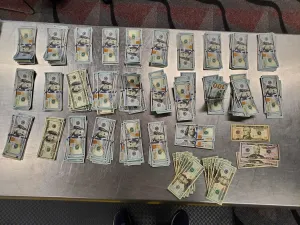MINNEAPOLIS— On Monday, February 6, U.S. Customs and Border Protection (CBP) officers at Minneapolis-St. Paul International Airport (MSP) seized more than $26,000 from a passenger traveling to Vietnam.
CBP Officers encountered a passenger and inquired about his travel. The traveler reported he was traveling with $9,000. During the baggage exam, the CBP officer discovered a total of $26,000.
The CBP Officer explained to the traveler that there is no limit to how much currency or other monetary instruments that can enter or leave the country, however, any amount over $10,000, requires the completion of a U.S. Treasury Department of International Transportation of Currency or Monetary Instruments form (FINCEN 105). If not properly reported, it is subject to seizure under U.S. federal law [31 U.S.C. 5316]. In addition, travelers crossing U.S. borders are required to report all currency and other monetary instruments in their possession that exceeds $10,000 to a CBP officer. Read more about currency reporting requirements.
The traveler admitted to the CBP Officer he was not aware of the requirements. “International travelers must be truthful in reporting all currency in their possession to CBP officers when they arrive to or leave the United States,” said Augustine Moore, Area Port Director-Minnesota. “It is less painful to complete a simple form than it is to surrender all their currency for violating U.S. currency reporting laws.”
The consequences for violating U.S. currency reporting laws are severe; CBP officers can seize unreported currency, and travelers could potentially face criminal charges. An individual may petition for the return of seized currency but must prove that the source and intended use of the currency was legitimate.
“Customs and Border Protection wants to make clear that there is no limit to the amount of money that travelers may carry when crossing U.S. borders, we only ask that travelers be truthful with CBP officers and fully comply with federal currency reporting laws,” said LaFonda D. Sutton-Burke, Director of Field Operations, Chicago Field Office.
During inspections, CBP officers ensure that travelers fully understand federal currency reporting requirements and offer multiple opportunities to accurately report all currency and monetary instruments.
CBP officers have observed that unreported currency can be proceeds from illicit activities, such as financial fraud and narcotics smuggling, and work hard to disrupt the export of these illicit revenues.
CBP’s border security mission is led at 328 ports of entry by CBP officers from the Office of Field Operations. Please visit CBP Ports of Entry to learn more about how CBP’s Office of Field Operations secures our nation’s borders. Learn more about CBP at www.CBP.gov.


